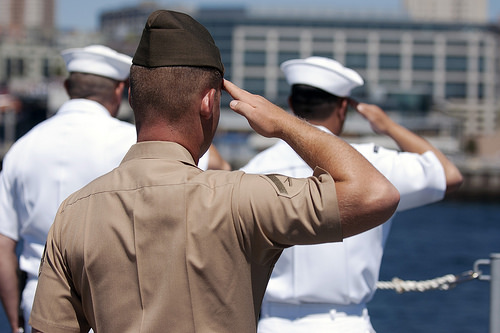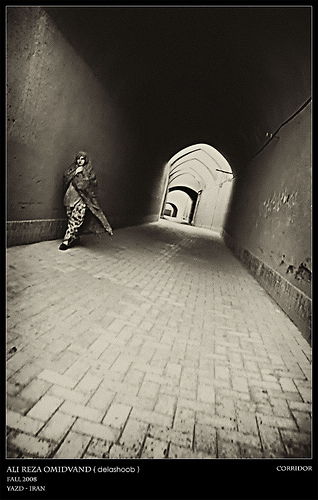7 Mistakes to Avoid When Writing about the Military
Today’s guest post is by authors J. R. Olson and David Bruns:
As long as there’s been a military, there have been authors writing about the military. It’s a natural fit. The military provides the perfect combination of conflict and character, adversary and attitude. Some novels, like Joseph Heller’s Catch-22, seek to satirize war and the military, while others, such as Steven Spielberg’s Saving Private Ryan, offer a more serious view of the battlefield. Whether your literary goal is to honor or skewer the armed forces, nothing bothers military veterans more than when well-meaning authors make factual errors about simple military customs.
We’re a pair of US Navy veterans with a combined thirty-five years of service who blog and write under the moniker The Two Navy Guys. We’re here to dish out the truth about 7 common mistakes we see from authors writing about the military:
- The Wrong Uniform: Military people don’t wake up and decide which uniform to wear—they are told what to wear. Each branch of the US armed forces (Marine Corps, Navy, Coast Guard, Army, and Air Force) has distinctive uniforms that change with the climate and the working conditions, as well as strict regulations about how and when they are worn.
For example, when David was stationed on board a submarine, the underway uniform was a blue jumpsuit with a belt to hold a radiation-monitoring device, but we never wore those uniforms in port, and they are not worn on US Navy surface ships.
Before you write a scene in which your main character shows up at the Pentagon dressed in desert camouflage fatigues in the middle of December, ask a veteran what your character should be wearing for such an occasion.
- Use of First Names: Spielberg got this one right in Saving Private Ryan. In every exchange, Captain Miller (Tom Hanks) calls Master Sergeant Horvath (Tom Sizemore) by his rank: “Sergeant Horvath.” It’s an understood truth in the US Army that once someone makes sergeant, you call them “sergeant” regardless what rank of sergeant they have earned, except when someone achieves the rank of sergeant major. Then you call them “Sergeant Major”—always. Other services have their own idiosyncrasies; take the time to learn the lingo, and you’ll have happy readers.
Spielberg also adhered to an age-old tradition of officers and enlisted personnel never addressing each other by their first names, except under very specific circumstances. In the one case when Miller and Horvath have a conversation on a first-name basis, it is done privately, out of earshot of the other men in the squad, as they discuss options for their mission to find Private Ryan. This was an accurate depiction of the bond that is built between military professionals of officer and senior enlisted rank once they have known each other for a very long time.
Among officers of differing rank, the rules are slightly different. When we were serving aboard ship as junior officers, our captain sometimes used our first names at a meal, but we always responded with “Captain” or “sir” in reply. However, in a professional setting, like on the bridge, the captain always addressed us by our rank.
- Salutes: Nothing is more iconic than a military salute and nothing more galling to a veteran when you get it wrong. To make matters worse, the rules can seem puzzling to outsiders. Here are some guidelines to get you started:
Salutes are rendered to senior officers of any service by junior officers and enlisted personnel. Enlisted men and women do not salute each other. There is nothing more idiotic than when a senior person salutes someone junior to her. You might feel it’s a touching gesture, but you’ve just lost your military readers.
Saluting customs vary by service. In the Navy, we don’t wear a “cover” or hat indoors, and we don’t salute uncovered. The Army and the Air Force can salute uncovered, but normally do not salute indoors unless reporting to a superior officer. Of course, all these rules can be altered for special situations, like boot camp, ceremonies, or when acting in an official capacity, such as a duty officer.
- Know Your Hardware: Ask any editor who works with military novels and they’ll tell you the number one mistake they see in manuscripts is inaccurate details about weapons. Military readers love their hardware—and can get pretty upset when you’re not accurate. Not sure if the Glock has an external safety? A simple Google search will tell you the answer is no.
It’s not just safeties and ammo sizes either. Your readers expect the weapons to be used correctly as well. Your character is not going to fire a shoulder-launched missile from inside a helo without the exhaust blast cooking all his squad mates behind him (sorry, Rambo).
- Too Much Military Equipment: Take the film Independence Day, an entertaining alien-invasion flick that includes a climactic scene in which the US fights back. But when the Marine Corps F/A-18 Hornets attack the alien space ship over LA, the film depicted about twice as many Hornets as have existed on the entire West Coast—ever!
It would have been one thing to create a mix of Marine Corps, Navy, and Air Force combat jets all massed for an attack on something the size of a city, but when you deliberately specify a single service, a little homework would have made it more “believable.” Yeah, we know, it’s a science fiction movie with aliens, and we’re arguing about making things realistic. Think of it this way: you can make your science fiction or fantasy novel even better if you do a little homework.
- Military Operations: Bunching troops together in a combat zone is a great way to make sure your characters can have witty banter, but the reality is that massed troops are easier to kill. Troops in the field, especially in a combat zone, will spread out—a lot! They will maintain eye contact with the men around them, and more often than not use hand signals to communicate.
Remember, weapons today are accurate out to hundreds of yards, which means you can provide effective supporting fire to your comrades from a distance. A recent movie that used the hand gestures and military tactics well was Lone Survivor. Director Peter Berg took great pains to ensure the technical accuracy in the operational behavior of his four protagonists, and that made the movie stand out as a great example of proper movement in enemy terrain. If you are an author writing a combat scene, take the time to make it authentic.
- Operational Security: We’ve just spent this entire blog post scolding you to get things right, and now we’re going to tell you to do the opposite. When we were writing Weapons of Mass Deception, we had a few instances when we knew the operational capabilities of certain military units, and we deliberately chose to dial it back. In our view, getting hand signals and saluting details right is a far cry from divulging specific tactics.
We hardly think a nuclear terrorist is going to use our novel as a handbook to attack the US, but we also know that people make connections in all sorts of ways. In WWII, the slogan was “loose lips sink ships,” and in our view, it still applies today. That juicy intelligence detail that your Army friend told you? Make sure it’s necessary for your story before you use it.
There you have it—seven ways to make your military characters more authentic along with our own thoughts on operational security. The best rule of all: when in doubt, ask a veteran. You’ll find the men and women of any service more than willing to share their experiences. Trust me, all of us will be glad you got it right.
 The Two Navy Guys are J. R. Olson and David Bruns, both graduates of the US Naval Academy and US Navy veterans. Check out their coauthored military thriller about modern-day nuclear terrorism, Weapons of Mass Deception, here. Visit their blog, Two Navy Guys and a Novel, which shares the trials and tribulations of cowriting and self-publishing.
The Two Navy Guys are J. R. Olson and David Bruns, both graduates of the US Naval Academy and US Navy veterans. Check out their coauthored military thriller about modern-day nuclear terrorism, Weapons of Mass Deception, here. Visit their blog, Two Navy Guys and a Novel, which shares the trials and tribulations of cowriting and self-publishing.
Feature Photo Credit: Hammerin Man via Compfight cc












Great blog, guys. Thanks for this. The bottom line, no matter what you are writing about, is do your research!
Hi Karen –
Thanks for stopping by. You’re dead right about the research part. I think sometimes writers feel like they “know” military characters from movies and that can lead to some bad assumptions. Any vetrean I know would be happy to talk about his/her service.
Thanks –
David
Great post, thanks for sharing! As a fantasy/sci-fi author, I really appreciate it when someone takes the time to make genre fiction more believable. Small details like the ones mentioned here can make all the difference.
Hi Nicholas –
The details are the difference between a good character and a great character–no matter the genre!
Thanks –
David
Advice from experts in any field is always helpful to novelists. Being a farm girl from Central Michigan with at least one story to write involving military characters, I read this post with interest.
Thanks for the specific tips, as well as the general advice. It is deeply appreciated!
You are very welcome, Carrie. Our tips will get you started, but each branch of service has their idiosyncrasies, so ask on specific details when you get to that point.
David
Great post. I would add Number 8: Use the right rank. Majors don’t command platoons and Warrant Officers don’t head up super-secret military labs. Of course, there are caveats … in the Navy a Lieutenant can command a minesweeper (and be called Captain!) and wartime losses are usually made up by hauling everyone up to the next step in the chain of command (when killed in battle, the Marine Captain CO of a company may be replaced the senior platoon leader, probably a First Lieutenant).
Also, regarding uniforms, blue jumpsuits became a common underway uniform on surface ships after I left DDG-51. I’m not sure if that is still true, but should be easy enough to find out.
Thanks, Scott. The hardest part about writing this post was deciding what NOT to include. We originally had 10 items and scaled back…
The comment about rank is right on–and very confusing! That topic by itself is worthy of a post once you include all the services.
Thanks for pointing out the underway DDG uniform. (I didn’t include the tidbit that we called them “poopy suits” on a sub.)
David
Thank you for the insightful article. So very true. We Marines are very particular about our culture, for it is unlike any of the other branches.
Regarding Marines:
Always capitalize Marine; it’s like a second name for us. The above rules regarding rank are somewhat different for Marines. We never call someone a sergeant unless they are a sergeant, and we never call them “Sarge.” Anyone else is a staff sergeant, gunnery sergeant, master sergeant, first sergeant, master gunnery sergeant, or sergeant major…or Sergeant Major of the Marine Corps. The only exceptions I can think of are “Gunny” in lieu of gunnery sergeant, “Master Guns” in lieu of master gunnery sergeant, “Top” in lieu of first sergeant. We Marines will call you out on that.
Also, for Marines and Sailors, the proper response to an order is, “Aye, aye, sir/ma’am/sergeant/corporal,” etc. Never, “Yes, sir/ma’am/sergeant/corporal,” etc.
I don’t care what AP or Chicago says on the matter. When you address someone by their title only, or by their rank only, you are renaming them and that deserves a capital letter. “What can I do for you, Corporal?” It’s like calling him Bill, or Smith, or Lefty.
I’d rather irk a few overzealous grammar nazis when I capitalize S-2, as in “S-2, where are those damned INTSUMs?” than irk a few veterans for the lack thereof. Veterans gave part of themselves for their country, and their sense of propriety comes from dedication to a cause greater than themselves. The least I can do is put a capital letter where it belongs and respect their customs and courtesies!
Thanks for this post guys. I’d be interested in talking to a female EOD Specialist–either former or current. Can you provide resources on how I can go about doing that? Thanks.
Hi Evolet –
Thanks for dropping by. I would start by looking for EOD specialists first and seeing if you can find a woman with that specialty once you have a way to talk to people in that community. I’d contact veteran organizations as a start.
David
Great article!
I don’t write military fiction and I hardly read it, but I know getting military matters wrong is super easy. I think it’s probably one of the more mistreated subjects in storytelling of any kind. It’s Always nice to see thinkgs straightened up 🙂
Thanks for stopping by. I think any sub-culture has their idiosyncrasies, but the military often gets mischaracterized because we think we “know” them from the many movies and books that are out there. Many times it’s hard to distinguish fact from fiction.
-David
there are army soldiers who work in the pentagon and wear ACU’s. back in the day it was BDU’s. Not everyone wears dress greens there.
the biggest mistake i’ve seen written about the military is that it’s exciting all the time. in truth it is mostly boring maintenance work, sitting around or if you’re in the infantry or combat arms lying in dirt for hours in the middle of the night pulling imaginary security.
LOL – how true! The old saw has it right: “I joined the Navy to see the world, and what did I see? I saw the sea.” I can’t tell you how many land masses I’ve seen through the lens of a periscope. No, I mean it, I literally can’t tell you.
– David
Gentleman, I recommend you follow your own advice more carefully. Your article contains two glaring errors of the sort you admonish others not to make. In the Army there are two noncommissioned officer ranks that are addressed as something more than sergeant. Sergeant major, as you correctly state, and First sergeant. See AR 600-20.
Your other error is listing the services in the wrong order of precedence. The correct order is Army, Marine Corps, Navy, Air Force, with Coast Guard listed either before or after the AirForce, depending on whether the CG is acting as part of the Navy or DHS. Your listing of the three maritime services first illustrates your bias as dormer naval officers
Dear Stanton –
Thanks you for pointing out our error on the Army ranks. I can say that we had two former Army members (one officer, one non-com) read our article for accuracy and neither caught it. (That said, the error is our responsibility.) You make our point for us, these idiosyncrasies are not simple.
On the second point of showing bias toward water-borne services…guilty as charged. 🙂
Even futuristic sci-fi writers need to know these things, because the readers who like hard military sci-fi will take you apart if you get things wrong. They don’t want to hear that it’s 1,000 years in the future and things might have changed.
Agreed, Floyd. Sci-fi gives you the chance to bend the rules, but I think readers appreciate it if the author makes an effort to follow a known convention.
– David
All correct points… but you forgot one. Many officers’ ranks include modifiers: e.g., Second Lieutenant, First Lieutenant, Lieutenant JG (Junior Grade), Lieutenant Commander, Lieutenant Colonel, Lieutenant General, etc. In most circumstances, when addressing an officer by rank and last name, the modifier is omitted. This used to drive me to distraction when watching episodes of the classic sci/fi show “Babylon 5” to hear dialog lines like, “Yes, Lieutenant Commander!” Of course one could argue in this case that in a futuristic setting the protocols might be different, but the main objective of any writer should be to connect with one’s audience, and getting such a detail incorrect runs the risk of throwing the reader (or viewer) out of the story.
Kim Headlee
USAFA Class of 1981
Hi Kim –
You are so right! We actually had a heck of a time whittling down our list of things t talk about, We have more than enough material for another post!
– David
As we say in the tactical jet community, “shack.” Exactly on target.
I would add that overly-patriotic, flag-waving dialogue does not ring true to military members. We don’t talk that way. We just do our jobs and leave the Team America rah-rah stuff to others.
Thanks for the article. Your fascinating facts were helpful and I write for children! I’ve researched and worked on a WWII picture book for over a year. At times, it can be overwhelming. But I think even our youngest readers can reap the benefits of accurate details. I’m filing your article for future reference.
Thanks, Sally!
No matter how correctly or incorrectly an author portrays the scene, there is no way running from the laughter the scenes bring with them in the wardrooms, barracks and cabins. We will always find flaws 🙂 and reasons to laugh.
Hail Brotherhood !
I would add that profanity and swearing is often done ‘wrong’, particularly in period pieces. Soldiers in World War II swore in different ways than we do today. Even then, while curse words may be used as punctuation in both real life and the movies, doing so in print is usually overwhelming and turns readers off.
Oh yea, I did a TON of research on the military when I decided I wanted to write a military book. I did that for a few reasons.
First off, I didn’t want to look like a dumbass lol. Who does?
Second off, I didn’t want to disrespect ANYONE in the military.
Third off…. it was fun. What can I say?!
I wrote the first book in the series, got an illustrator to draw out the cover, professionally edited, etc. I put a lot of heart and soul into that book and I will do the same for book 2!!!
Some people think it’s odd a female writing a book like this, but I really loved writing it. It was a lot of fun getting to do something different for once!
These are great comments, but I have a specific question for everyone: Am I breaking any military rules by setting my novel in a real department on a real Naval base? I wouldn’t be revealing any military secrets because I didn’t know any, and my characters would be fictitious. I served there in the 1970s and remember enough to provide the verisimilitude, but I just want to be sure there aren’t any restrictions concerning this.
This was really great advice! I served 30 years in the Army and I couldn’t have said it better myself. One bit of advice that I would add, if you are writing a novel that is heavy military then have a veteran beta read it.
Lee Childs really annoys me, I love reading his books, but he is a British author writing and American character and he has a lot of preconceptions that are incorrect. His character is a ex Military Police because “MPs need to be better trained in weapons and hand to hand” in order to subdue Rangers and Green Berets that need to be arrested – crazy. Also, I guess enlisted men do officer laundry and shine their boots in the British Army, but in the US Army that never happens.
Great post!